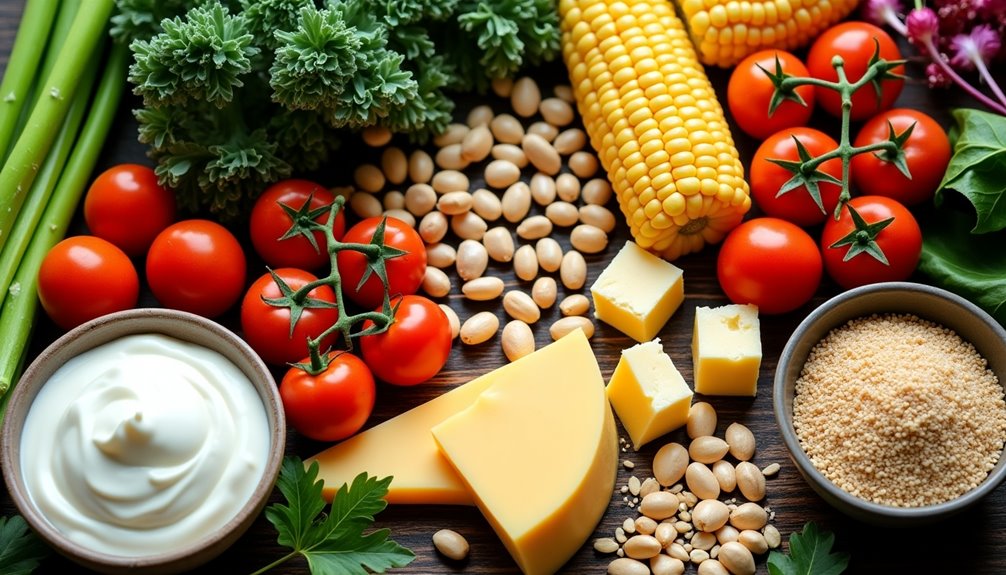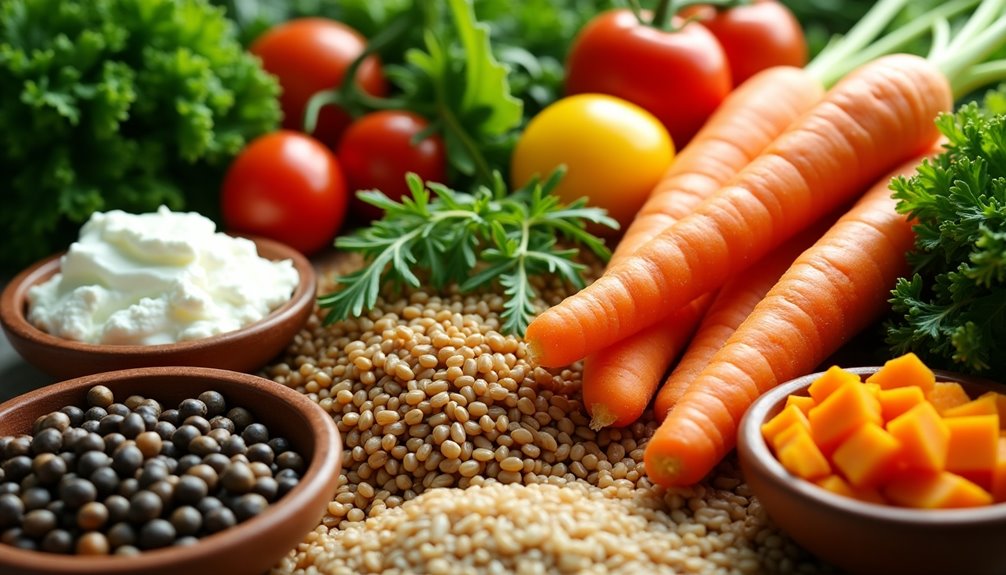A lacto-vegetarian diet lets you enjoy a variety of plant-based foods while including dairy products like milk, cheese, and yogurt. You'll be avoiding meat, fish, and eggs, which can lead to numerous health benefits, such as improved heart health and lower cholesterol levels. This diet also offers essential nutrients from legumes, whole grains, fruits, and vegetables. Plus, it supports a commitment to animal welfare and connects you with a community of like-minded individuals. By exploring different recipes and meal planning strategies, you can enhance your culinary experiences and overall well-being. Find out more about optimizing this lifestyle!
Key Takeaways
- A lacto-vegetarian diet includes plant-based foods and dairy, but excludes meat, fish, and eggs.
- Common motivations for this diet include ethical concerns, health benefits, and community connection.
- It offers significant nutritional advantages such as improved heart health and reduced chronic disease risk.
- Key foods include legumes, whole grains, fruits, vegetables, and dairy products for balanced nutrition.
- Meal planning should focus on variety, using fresh produce and experimenting with diverse recipes.
What Is a Lacto-Vegetarian Diet?

A lacto-vegetarian diet includes a variety of plant-based foods along with dairy products, but it excludes meat, fish, and eggs. This dietary choice allows you to enjoy a wide range of fruits, vegetables, grains, legumes, nuts, and seeds while incorporating dairy items like milk, cheese, and yogurt. By embracing dairy inclusion, you can enhance your meals with flavors and textures that many find comforting and satisfying.
One of the primary motivations for adopting a lacto-vegetarian diet is the ethical considerations surrounding food choices. Many people choose this path to minimize their impact on animal welfare. By avoiding meat, fish, and eggs, you align your eating habits with a commitment to reducing harm to animals. This ethical stance resonates with those who seek to make more compassionate choices in their lives.
Additionally, a lacto-vegetarian diet can foster a sense of community. Many individuals who follow this lifestyle connect with like-minded people who share similar values and beliefs regarding food, health, and the environment. This sense of belonging can be empowering, as you exchange recipes, tips, and experiences with others who appreciate the ethical implications of their choices. Furthermore, a lacto-vegetarian diet can provide significant health benefits, including reducing the risk of cardiovascular disease and promoting overall well-being.
Nutritional Benefits of Lacto-Vegetarianism

Embracing a lacto-vegetarian diet can greatly enhance your nutritional intake. By incorporating dairy products and plant-based foods, you access a wealth of essential nutrients. This diet is rich in vitamins, minerals, and antioxidants, contributing to overall health benefits such as improved heart health and better weight management.
Studies show that those who follow a lacto-vegetarian diet often have lower cholesterol levels and reduced risk of chronic diseases, like diabetes and hypertension.
Moreover, you'll benefit from a diverse array of proteins, as dairy products and legumes provide amino acids essential for muscle repair and growth. Calcium and vitamin D from dairy are crucial for bone health, while fiber from fruits, vegetables, and whole grains supports digestive health. It's a balanced approach that can help you feel fulfilled and energized. Additionally, incorporating plant-based protein sources into your meals can further enhance your diet's nutritional profile.
Additionally, the environmental impact of adopting a lacto-vegetarian diet is significant. By reducing your consumption of meat, you contribute to lower greenhouse gas emissions and decreased land and water usage. This conscious choice aligns with a growing community focused on sustainability and ethical eating. You're not just nourishing your body; you're also participating in a movement that prioritizes the planet's health.
Key Foods to Include

Incorporating a variety of key foods is crucial for a well-rounded lacto-vegetarian diet. By choosing diverse food options, you can make sure you're getting the necessary nutrients while enjoying the flavors you love. Focus on including nutrient-dense foods that provide essential vitamins, minerals, and protein sources. Here are some key foods to take into account:
- Legumes: Beans, lentils, and chickpeas are excellent protein sources that also offer fiber and iron.
- Whole grains: Quinoa, brown rice, and whole wheat products provide complex carbohydrates and help keep you full.
- Fruits and vegetables: A colorful array of produce supplies important vitamins, antioxidants, and fiber, contributing to your overall health.
- Dairy alternatives: Options like almond milk, soy yogurt, and cashew cheese can help you meet your calcium needs while adding variety to your meals. Additionally, incorporating plant-based diets can greatly benefit your overall health and reduce your environmental impact.
Meal Planning Tips

When planning meals for a lacto-vegetarian diet, it's important to prioritize balance and variety. Start by incorporating a wide range of foods to optimize you're getting all the essential nutrients. Focus on whole grains, legumes, dairy products, fruits, and vegetables. This way, you'll not only enjoy diverse flavors but also benefit from a well-rounded diet.
During your grocery shopping, make a list of staples to keep on hand. Items like brown rice, quinoa, lentils, and various beans can form the foundation of your meals. Don't forget to add fresh produce that's in season for ideal flavor and nutrition. By buying local and seasonal, you'll likely save money and enjoy fresher options.
For recipe ideas, consider creating a weekly meal plan that highlights different ingredients. You could start with a hearty vegetable stir-fry one night and a creamy spinach and ricotta stuffed pasta the next. Incorporate smoothies with yogurt and fruits for breakfast, or snack on hummus with veggies for a healthy option.
Experimenting with spices and herbs can elevate your meals, making them more enjoyable. Don't hesitate to try new recipes or tweak old favorites to suit your taste. Remember, connecting with friends or family over a shared meal can enhance your experience, so invite loved ones to join you in your culinary journey. By planning thoughtfully, you'll feel more satisfied and aligned with your dietary choices. Additionally, incorporating lifestyle changes is crucial for overall health and can help manage conditions like CKD effectively.
Common Misconceptions

Many people hold misconceptions about lacto-vegetarian diets, often leading to confusion about their nutritional adequacy. You might think that eliminating meat means you're missing out on essential nutrients, but that's not the case. A well-planned lacto-vegetarian diet can provide all the nutrients your body needs, including protein from various sources.
Here are some common misconceptions you might encounter:
- You can't get enough protein: Lacto-vegetarians can easily obtain protein from legumes, nuts, seeds, and dairy products. These protein sources guarantee you meet your daily requirements without meat.
- Dairy is the only option for calcium: While dairy is an excellent source of calcium, there are also plenty of dairy alternatives fortified with calcium, such as almond milk, soy milk, and leafy greens.
- Lacto-vegetarian diets are boring: This diet is rich in variety! You can explore countless delicious recipes featuring fruits, vegetables, whole grains, and legumes.
- It's hard to eat out as a lacto-vegetarian: Many restaurants now offer diverse vegetarian options, including those that cater to lacto-vegetarians. You can enjoy a meal out without compromising your dietary choices.
Additionally, a lacto-vegetarian diet can be just as effective for weight loss as a keto diet, as both can help you achieve your goals while maintaining a nutritious meal plan.
Frequently Asked Questions
Can Lacto-Vegetarians Eat Eggs or Fish?
If you're curious about whether you can eat eggs or fish, it's important to clarify your dietary choices. Generally, egg consumption is acceptable for many, but if you identify as a lacto-vegetarian, you won't include eggs in your diet.
Likewise, fish intake isn't part of this lifestyle. Embracing a lacto-vegetarian diet means focusing on dairy and plant-based foods while avoiding both eggs and fish for a compassionate approach.
How Does a Lacto-Vegetarian Diet Affect Athletic Performance?
So, you think munching on kale and cheese will magically make you run like the wind? Well, it might! A well-planned diet can boost your energy levels and enhance muscle recovery.
You'll find that the right combination of plant-based proteins and dairy can help you power through workouts. Just remember, balance is key; your body needs the right nutrients to perform at its best, so don't skimp on those leafy greens!
Is a Lacto-Vegetarian Diet Suitable for Children?
A well-planned vegetarian diet can meet children's nutritional needs, supporting their growth development effectively. It's important to make sure they get enough protein, iron, calcium, and vitamin B12, which are essential during these formative years. Incorporating a variety of fruits, vegetables, whole grains, and dairy can help achieve this balance.
If you're considering this diet for your kids, consulting a nutritionist can provide personalized advice to make sure they're thriving and healthy.
Can Lacto-Vegetarians Consume Processed Foods?
You can't judge a book by its cover, especially when it comes to processed foods. While many processed options might fit into your dietary preferences, it's important to check their nutritional content. Some processed foods can be high in sugar, sodium, or unhealthy fats, which may raise health implications over time.
Focus on whole foods and read labels to make sure you're making informed choices that align with your health goals and lifestyle.
What Are the Environmental Impacts of a Lacto-Vegetarian Diet?
Adopting a plant-based diet can greatly reduce your carbon footprint. Studies show that consuming fewer animal products leads to lower greenhouse gas emissions. Additionally, it promotes water conservation, as plant-based foods typically require less water to produce compared to meat.
Conclusion
Incorporating a lacto-vegetarian diet can be a vibrant tapestry of health and flavor. By focusing on dairy and plant-based foods, you're fueling your body with essential nutrients while enjoying a variety of delicious meals. This lifestyle not only supports your well-being but also promotes environmental sustainability. As you explore this dietary choice, remember that balance and variety are key to reaping the full benefits. Embrace the journey, and let your plate reflect your values and health goals.



